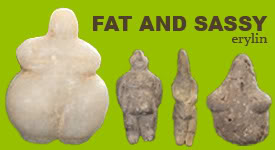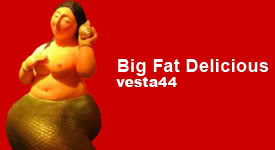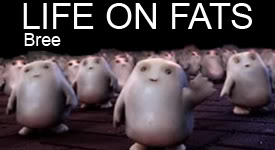UCLA Gender and Body Size Videos
May 3, 2024
 UCLA Center for The Study Of Women had a series of talks on Gender and Body Size (PDF) and then posted videos of them on youtube. Although the audio quality on some of the recordings is uneven, if you like getting your information in lecture format these are great FA 101 pieces.
UCLA Center for The Study Of Women had a series of talks on Gender and Body Size (PDF) and then posted videos of them on youtube. Although the audio quality on some of the recordings is uneven, if you like getting your information in lecture format these are great FA 101 pieces.
Paul Campos: Fat and Identity Politics (PDF summary of talk)
I found the Q&A with Paul Campos after the Lecture (Quicktime) really interesting becasue he actually argues some of the points with audience members.
Katherine M. Flegal, Weight and Mortality: The Population Perspective (PDF summary of talk)
Marilyn Wann: Fighting Fat Fear
8 Comments
leave one →























Whew! That was a lot to ingest, but I listen to most of them (I got about halfway through Katherine Flegal’s and just couldn’t hear well enough to make it worth it.)
Campos was great. He’s definitely on my list of interview subjects. And Marilyn Wann was really fun and she really illustrates the aims of FA quite effectively. Very cool series of videos. Thanks for posting!
Peace,
Shannon
atchka-
I totally want to steal Marilyn Wann’s pie example to show how weight is a combination of food, exercise, and genetics…instead of the just food or just exercise some seem to think.
I do too, but I want some research to back it up. I would gladly make said pie chart if I had all the data to cite and include in the final graphic.
Peace,
Shannon
The studies I’ve found in the past (like this one : http://jama.ama-assn.org/cgi/content/abstract/256/1/51) say that weight is about 80% based on heritability.
This one (http://www.ajcn.org/cgi/content/full/87/2/398#R4) lists a couple different sources and talks about the “heritability estimates in adults ranging from 55% to 85%.”
As I understand the genetics (and correct me if I’m wrong), the genetic traits that include that 55-85% are things like appetite, hunger, satiety, metabolism, the thrifty gene, etc. So, it’s genetics plus environment. Genetics alone doesn’t determine weight. So, my fear is that giving a genetics plus environment message would just make them turn around and say, “Well then, adjust your environment.” Right?
Peace,
Shannon
Does this help answer your question? It’s an excerpt from the second link I listed :
Probably the most controversial finding from twin studies is the relatively low shared-environment effect, a finding that has been observed for behavioral traits. Discussions about the obesity epidemic almost invariably ascribe a key role to the family, but, in the present study, as in other twin and adoption studies, siblings from the same family were only slightly more similar in adiposity than would be expected from their genetic similarity, and the shared-environment effect was estimated at just over 10%. The fact that siblings’ experience of being served similar food, being given the same options for television viewing and active outdoor play, seeing the same behaviors modeled by parents, and going to the same school does not make siblings more similar is a challenge for etiologic models that highlight the home environment as the root cause of obesity. This finding will, however, come as no surprise to parents, who are well aware that their children come in different shapes and sizes despite having a similar upbringing. What is important is this finding means that “blaming” parents is wrong. Findings from twin studies were influential in persuading clinicians that the “schizophrenogenic” mother was a myth. Results from the present study highlight the fact that excessive weight gain in a child is unlikely to be the fault of the parents and is more likely to be due to the child’s genetic susceptibility to the obesogenic features of the modern environment.
atchka -
I’m not sure I completely understand your question, so I’m kinda fishing around to see if I have the right answer.
“So, it’s genetics plus environment.”
Are you saying “appetite, hunger, satiety, metabolism, the thrifty gene” can be counted on the environment side? I would argue that the research showing semi-starvation neurosis (http://www.psychosomaticmedicine.org/cgi/content/abstract/10/1/31) mean those biological influences are not so easily quelled.
“make them turn around and say, ‘Well then, adjust your environment.’ Right?”
For those that are looking for an argument that isn’t nuanced, they’re going to grasp onto that 15-45% of environmental influence and declare the end of the argument. I’m not sure there is anything to be done about the people that want things black and white, other than to ignore them.
No, I meant that appetite, hunger, etc. are all genetically driven. But, as the last sentence in your last comment said, it is the obesogenic environment that triggers those genes into action. So, somebody with a more active thrifty gene, when given the exact same diet as a child with a less active thrifty gene, will store more energy and therefore put on more weight despite eating the exact same thing. Does that make sense?
Peace,
Shannon